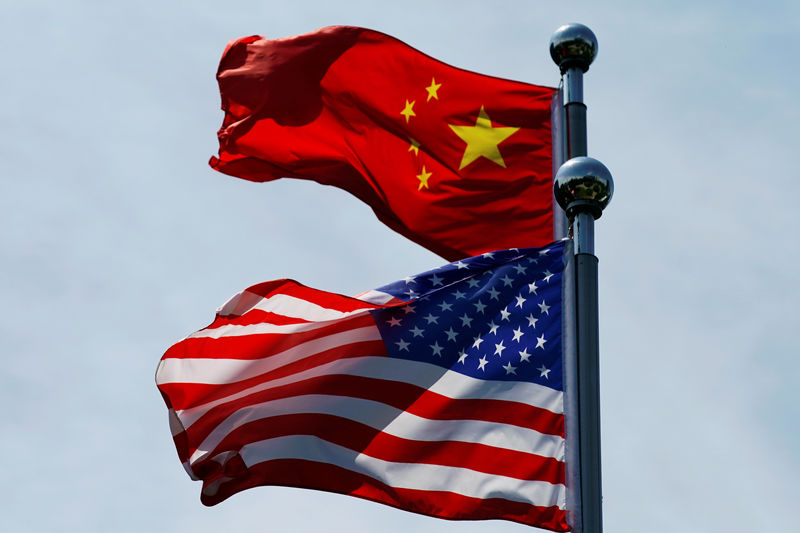By David Lawder and Andrea Shalal
WASHINGTON (Reuters) - China is pushing U.S. President Donald Trump to remove more tariffs imposed in September as part of a "phase one" U.S.-China trade deal, people familiar with the negotiations said on Monday.
The deal, which may be signed this month by Trump and Chinese President Xi Jinping at a yet-to-be determined location, is widely expected to include a U.S. pledge to scrap tariffs scheduled for Dec. 15 on about $156 billion worth of Chinese imports, including cell phones, laptop computers and toys.
A U.S. official said the fate of the Dec. 15 tariffs is being considered as part of negotiations and a potential signing trip this month.
Another source briefed on the talks said Chinese negotiators want Washington to drop 15% tariffs on about $125 billion worth of Chinese goods that went into effect on Sept. 1. They are also seeking relief from earlier 25% tariffs on about $250 billion of imports from machinery and semiconductors to furniture.
A person familiar with China's negotiating position said it is continuing to press Washington to "remove all tariffs as soon as possible."
China's request to remove the Sept. 1 duties was earlier reported by Politico, citing sources. The Financial Times newspaper also reported the White House was considering whether to roll back the Sept. 1 tariffs, which cover some clothing items, flat-screen televisions, smart speakers and Bluetooth headphones.
Geng Shuang, a spokesman at the Chinese foreign ministry, said the two sides remained in touch.
"Trade consultations have made progress and are advancing in accordance to plan," Geng said.
On the tariff issue, Geng said he could only give an answer "in principle".
"Adding tariffs is not the correct way to resolve trade issues," he told reporters at a regular briefing in Beijing on Tuesday.Taoran Notes, an influential WeChat account run by China's Economic Daily, said the removal of the additional tariffs already imposed by the United States was China's "most core concern".
"Any miscalculation on this issue could well cause further back and forth in the consultations," it wrote.
Ralph Winnie, director of the China program at the Eurasia Center, said wrapping up the interim trade pact would provide a boost to both the U.S. and Chinese economies, while handing Trump an important win among farmers - a core constituency.
"It’s in both countries’ interest to have this trade deal," Winnie said. "If he seals the deal, it will be looked on very favorably by the American people. It’s a win-win for both countries."
Speaking on Tuesday at an import fair aimed at burnishing China's free-trade credentials, President Xi Jinping called on countries to stand against protectionism and reiterated pledges to open China's economy and strengthen protection of intellectual property rights.
Foreign governments and business groups have become skeptical of Chinese reform promises and have longed warned that China would invite retaliation if it didn't match the openness of its trading partners.
COPYRIGHTS, NOT SUBSIDIES
Since Trump took office in 2017, his administration has been pressing China to curb massive subsidies to state-owned firms and end the forced transfer of American technology to Chinese firms as a price of doing business in China.
Analysts say the phase one deal will fail to adequately address these issues, focusing largely on Chinese purchases of U.S. farm goods and intellectual property protections related to copyright and trademark issues. It will not address industrial subsidies at all.
China was requesting some changes to the text, but parts of the agreement are “very close to finished,” including the text on financial services, said a U.S. source briefed on the negotiations. The text on agriculture was “dozens of pages long and nearly completed,” the source said.
“It is important to both sides to get this agreement across the finish line,” said the source, adding that the two presidents were very likely to meet this month.
Charles Boustany, a former congressman from Louisiana and counselor at the National Bureau of Asian Research, said any initial agreement would likely be short-term in nature and unstable.
"Even though there's some talk about a phase one agreement, we don't think it’s going to be substantive in terms of addressing any of the structural problems," he said. "It would largely be a status quo situation where China continues to do what it’s doing."
Some business groups complain that a central component of the "phase one" deal - increased access to China's financial services market - will fall short of its promises, because of inconsistencies in China's new foreign investment law.
In comments submitted to the Chinese government by the U.S. Chamber of Commerce, the American Chamber of Commerce in China and the U.S. Information Technology Office, the groups pointed out that Beijing's draft regulations "do not address clear differences between the treatment of China's state-owned enterprises and the private sector," according to a person familiar with the comments.

Trump had said on Friday that negotiations on the initial phase agreement were going well and he hoped to sign the deal with Xi at a U.S. location when work on it was completed.